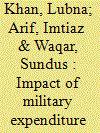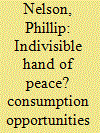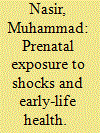|
|
|
Sort Order |
|
|
|
Items / Page
|
|
|
|
|
|
|
| Srl | Item |
| 1 |
ID:
179957


|
|
|
|
|
| Summary/Abstract |
This study investigated the causal linkages among democracy, regime durability and terrorism for a panel of 53 African countries over the period 1980-2012. Due to the count nature of terrorism data, the study employs a negative binomial regression estimator. The empirical analysis is based on four terrorism types namely: domestic, transnational, uncertain and total terrorism respectively. The following are the key findings: First, with the exception of the specification relating to uncertain terrorism, the unconditional effect of democracy was found to be negative on the other three dimensions of terrorism. Second, the unconditional impact of regime durability was also positive on terrorism with the exception of uncertain terrorism but in a rather inconsistent manner. Third, the interactions between democracy and regime durability are found to have positive marginal effects on all the terrorism types except uncertain terrorism. Fourth, the net effects of interaction between democracy and regime durability are positive across various models of these terrorism measures. Lastly, the theoretical priors of other covariates are equally validated across different measures of terrorism. On the policy arena, mitigating terrorism would require embracing democratic regime and mainstreaming the concomitant doctrines into the politico-institutional architecture but not without moderation in regime elongation.
|
|
|
|
|
|
|
|
|
|
|
|
|
|
|
|
| 2 |
ID:
179960


|
|
|
|
|
| Summary/Abstract |
In this paper, we propose a quasi-experimental approach to assess the effect that downsizing of the largest experimental military base in Europe, located in Sardinia, Italy, had on local economies. The study shows the fruitfulness of the Synthetic Control method for assessment of socioeconomic impacts on a single treated unit when other standard methods for impact evaluation are not feasible. It is shown that the local communities analysed have been characterised by different levels of frailty, which should be attentively considered if further downsizing of the base will be placed on the political agenda.
|
|
|
|
|
|
|
|
|
|
|
|
|
|
|
|
| 3 |
ID:
179959


|
|
|
|
|
| Summary/Abstract |
This study aims to empirically test the effects of military expenditure on external debt of 35 arms importing countries by using the annual panel data from the year 1995 to 2016. The panel was divided into two income classes (upper-middle and lower-middle), and the basic sample was also divided into five different regions (Middle-East and North Africa, South and East Asia, Latin America, Europe and Central Asia, and Sub-Saharan Africa) to achieve further robustness in the study. The empirical results of pooled mean group estimators suggest that military expenditure generally increases the external debt burden in the studied countries. More specifically, it was noted that military expenditure decreases external debt in Europe and Central Asia. Moreover, it was found that the interaction term of military expenditure and growth rate is positive and significant in all of the sub-samples, except upper-middle class, the Middle East and North Africa, and Latin American regions. Thus, it may be concluded that military expenditure often increases external debt burden in countries where the debt management system is weak. Countries with weaker debt management systems need to devise economic policies that curtail their military expenditure, reduce their external debt and improve their economic condition.
|
|
|
|
|
|
|
|
|
|
|
|
|
|
|
|
| 4 |
ID:
179956


|
|
|
|
|
| Summary/Abstract |
GDP is one of the most robust indicators of civil war onset. As debate continues over the mechanisms underlying the relationship between economic development and civil war, this paper scrutinizes the indicator of GDP directly, disaggregating it into its constituent components to examine whether their distinct associations with conflict onset can shed some light into the black box. Analysis of the individual correlations allows for identification of the driving force behind the aggregate statistical relationship. With this information to hand, consistency checks can be made with existing theories and a new theory presented in this paper, which draws attention to a critical structural factor that drives the supply of civil war labor, namely the lack of consumption opportunities. This factor increases the likelihood of civil war in less economically developed countries as individuals with low consumption opportunities have little to lose from reordering the economic and political system. Analysis of the correlations between components of GDP and the onset of civil war shows that this new theory is most consistent with the key drivers of the aggregate relationship. The examination also highlights a new indicator, which is arguably preferable to GDP as a measure of this relationship.
|
|
|
|
|
|
|
|
|
|
|
|
|
|
|
|
| 5 |
ID:
179955


|
|
|
|
|
| Summary/Abstract |
The escalated violent conflicts and political upheavals in many developing countries have emphasized the pertinence of examining the multifaceted nature of conflict, and the various strategies that bring about reasonable degrees of peace. This paper examines the effects of national economic and socio-economic factors on national peace level, and on the corresponding elementary indicators. The empirical analysis is implemented through a panel dataset, using different econometric methodologies. The basic results underline that countries characterized by higher economic development levels, open trade systems, more educated population, and democratic systems rest on higher national peace levels. Meanwhile, countries that experience higher levels of income inequality and that are endowed with natural resources tend to be less peaceful. Also, the positive impacts of international alliances/regional blocs on national peace are mainly expressed through their promoting economic effects rather than through their aggression-deterrence properties. The empirical analysis shows that the effects of national economic and socio-economic factors on the elementary indicators exhibit considerable variations in magnitude and significance. Hence, an exclusive examination of the effects of these variables on the overall peace index would conceal significant differences across the elementary indicators, which should be accounted for when analyzing national peace and developing peace-promoting strategies.
|
|
|
|
|
|
|
|
|
|
|
|
|
|
|
|
| 6 |
ID:
179958


|
|
|
|
|
| Summary/Abstract |
Simultaneous exposure to natural calamities and conflict shocks is a phenomenon that has been largely understudied. The interplay between natural disasters and conflict shocks can have adverse effects extending beyond the current family members to children in utero. The current paper tries to fill this gap by investigating the impact of floods on pregnancy and birth outcomes across conflict-affected and unaffected districts in Pakistan. Using mother fixed effects strategy, the results suggest that in-utero exposure to violence during flood increases the probability of small birth size by 4.7 percentage points. Moreover, simultaneous exposure to flood and violence increases the probability of miscarriages and stillbirths by 6 and 1.9 percentage points, respectively. Significant heterogeneities are found across income groups and education levels.
|
|
|
|
|
|
|
|
|
|
|
|
|
|
|
|
| 7 |
ID:
179961


|
|
|
|
|
| Summary/Abstract |
The usage of foreign direct investment (FDI) is a crucial element in the economic growth literature focusing on sustainable development. In the case of the aerospace sector, security considerations restrict FDI flows and the market-based creation of multi-national enterprises (MNEs), even more than they restrict trade. The role of the government is instrumental as such industries as they exercise significant control over structure and performance through procurement and regulatory aspects. Moreover, there are countries like the US whose aerospace is a leading exporting sector, while significant government expenditure flows impact through fiscal policy the economy at large. The analysis in this paper applies a sectoral analysis of economic development based on the ownership-location-internalization (OLI) theoretic framework for MNE activity for the case of the aerospace industry combined with the strategic trade and macroeconomic implications. The behavior of the government is examined within the macroeconomic, strategic economic and security framework towardidentifying a comprehensive framework of analysis.
|
|
|
|
|
|
|
|
|
|
|
|
|
|
|
|
|
|
|
|
|